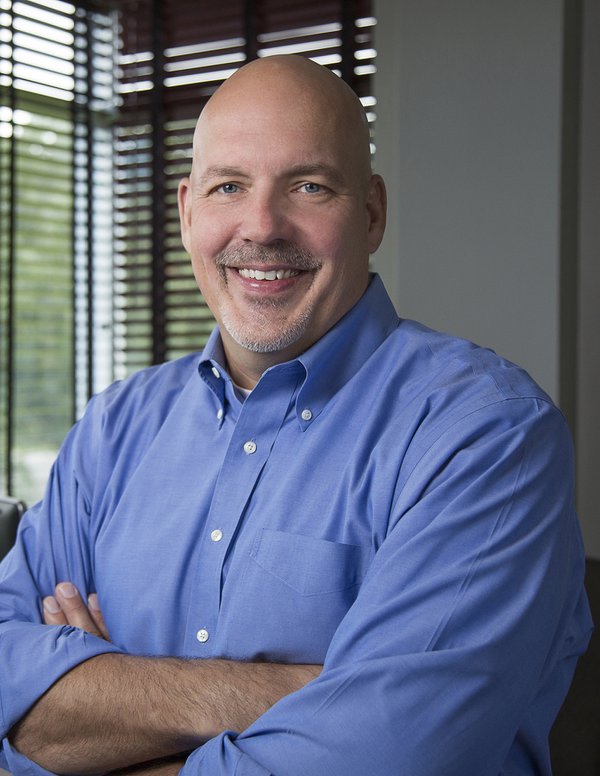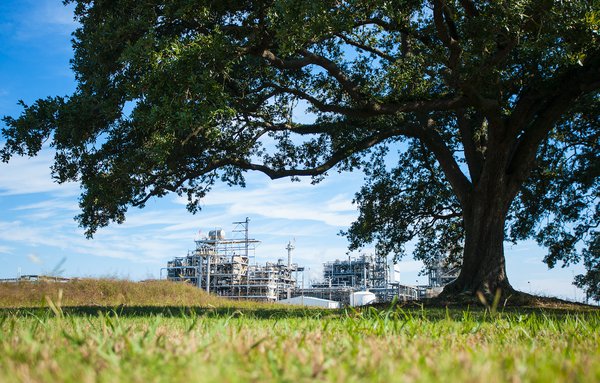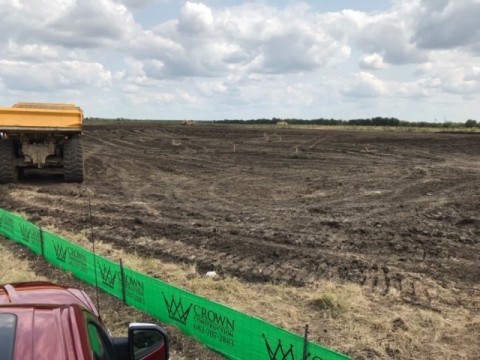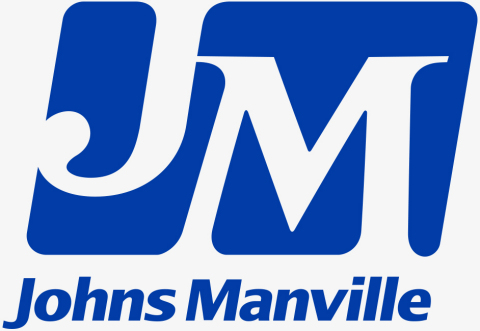The Urethane Blog
Everchem Updates
VOLUME XXI
September 14, 2023
Everchem’s exclusive Closers Only Club is reserved for only the highest caliber brass-baller salesmen in the chemical industry. Watch the hype video and be introduced to the top of the league: — read more
October 1, 2020
BASF’s Lebold leading Geismar site through expansion, pandemic
by Andrew White
October 1, 2020
BASF’s Jerry Lebold loves to restore old cars and motorcycles, and he attributes this passion to his father.

Jerry Lebold, Senior Vice President and General Manager, BASF Corp. — Geismar, Louisiana
At an early age, Lebold searched flea markets and junkyards with his father to find parts for classic cars such as a 1940 Hudson. Today, Lebold serves as senior vice president and general manager of BASF’s Geismar, Louisiana, site, a position he’s held since May 2019. According to Lebold, there are some similarities between rebuilding an antique car and managing the overall operations for one of BASF’s largest manufacturing complexes.
“Whether it’s restoring a Hudson or overseeing 32 production units on-site, you have to be able to solve complex problems and remove any barriers,” Lebold said. “As a general manager, I have to help remove these barriers that are keeping BASF team members from bringing their best to work each day.”
Lebold received a Bachelor of Science in electrical engineering and a Master of Science in mathematics from Ohio University. For his first job after college, he worked as a field service technician with Diamond Power, a division of McDermott. After Diamond Power, Lebold worked for companies such as Ford Motor Co., Monsanto and ICL, before joining BASF in 2012. Most recently, before coming to Geismar, Lebold worked in BASF’s global headquarters in Ludwigshafen, Germany.
“Throughout my career, I’ve found that most people will do their best each day to help the team be successful, if they’re provided the right opportunities,” Lebold said. “The most important skills for my current position include being a good, active listener and having the trust and confidence in people to empower them in their roles.”

With 32 production units and approximately 2,000 employees who help create chemistry every day, BASF’s Geismar, Louisiana, site is one of only six Verbund sites in the company’s global portfolio.
‘We create chemistry’
Founded in Germany in 1865, BASF is the largest chemical company in the world, with more than 122,000 employees working at its facilities across the globe. BASF’s Geismar site started production in 1958 and is one of only six Verbund sites in BASF’s global portfolio.
“Our site has 32 production units and manufactures more than 50 products for customers around the world,” Lebold said. “The chemistry created at our Geismar site can be found in products people use every day such as cosmetics, medicines, clothing, electronics, cleaning supplies and many others.”
Most recently, the biggest challenges facing the Geismar site are those created by the COVID-19 pandemic. According to Lebold, the chemical industry has had to adapt quickly and develop new, enhanced safety protocols to ensure the health and safety of its workforce.
“We developed these protocols while ensuring the continuation of safe and reliable operations at our facilities,” Lebold said. “To overcome the challenges we faced because of COVID-19, we had to work as a team throughout our own organization and with other companies and industries. We collectively shared best practices that allowed us all to quickly adapt to these new norms.”
According to Lebold, BASF is committed to protecting its employees, communities and the environment, striving to be best-in-class and place safety above all else. BASF’s sites have improved in environmental, health and safety performance over the past 10 years:
- 70-percent reduction in employee injuries.
- 75-percent reduction in spills.
- 60-percent reduction in emissions to air and water.
“We are continuously looking for opportunities to improve safety across our sites,” Lebold stated. “Safety is a core value and responsibility. We value people above all else and understand that we are responsible for the safety and welfare of our team members and community. Throughout the years, we have implemented safety programs that are always challenging us to improve.
“With that said, I believe the Geismar site has the best team, and we are well positioned for future success. I see many great possibilities, including the expansion of manufacturing facilities, research and development, third-party partnerships and sustainable projects. With the level of innovation and creativity at BASF, I think the Geismar site is at the forefront of bringing these innovations and creations to life. We have the people, resources and talent to make it happen.”
In order for the Geismar site to continue its manufacturing excellence, incentive programs like Louisiana’s Industrial Tax Exemption Program (ITEP) are crucial. According to Lebold, BASF’s Geismar site not only competes for business with other companies, but it also competes with other sites within BASF.
“ITEP is crucial to keep the Geismar site front-and-center with the BASF board of directors for future projects,” Lebold explained. “Being able to show that Louisiana has a stable, predictable pro-business environment is essential to the growth of BASF and the chemical industry. I will support efforts that improve the program and work to defeat measures that try to eliminate or reduce the benefits of it.”
Since 2018, BASF’s Geismar site has been constructing a new methylene diphenyl diisocyanate (MDI) synthesis unit. The new plant is an important step to double BASF’s annual MDI capacity in Geismar from 300,000 metric tons to close to 600,000 metric tons.
“MDI is an important component for polyurethanes, an extremely versatile plastics material that contributes to improved insulation for appliances, provides lighter materials for cars and helps save energy in buildings,” Lebold said. “Last year, we proceeded with the second phase of production expansion for MDI. This is a three-phase expansion, and we’ve received approvals on our ITEP applications for all three phases. We’re awaiting final approval of phase three by the BASF board of directors, which should come in the first quarter of 2021. The goal is for the Geismar site to have a world-class MDI facility to better serve the needs of our customers in the region.”
A community partner
As one of the largest employers in Louisiana, BASF’s Geismar site understands the important role it serves as both a business and community partner. The site works with more than 50 schools, universities, community and technical colleges, organizations and nonprofits in the area, donating $1 million annually to these organizations through financial and human resources. BASF’s community outreach focuses on workforce development, STEM education, health and wellness, economic development, sustainability and environmental improvements.

BASF Senior Vice President and Geismar site General Manager Jerry Lebold enjoys restoring antique and classic cars and motorcycles in his free time. Lebold’s favorite type of antique car is a Hudson.
“I’m also involved in a number of organizations including LCA, the Louisiana Association of Business and Industry, the Greater Baton Rouge Industry Alliance and the Committee of 100,” Lebold said. “I believe it’s important to represent BASF in these organizations and bring the unique perspective the company has on issues such as sustainability, safety, workforce development, innovation and technology. These organizations are instrumental in shaping the industry in Louisiana, and it’s important the best practices BASF is known for are included in shaping the approach of these organizations.”
Lebold emphasized that the chemical industry is vital to the well-being of everyone around the world, whether it’s producing key ingredients and products that help fight against COVID-19 and other infectious diseases or manufacturing products that improve people’s everyday lives.
“At BASF, we create chemistry for a sustainable future,” Lebold said. “We want to ensure the products we make will enhance lives well into the future. We innovate to improve not only the products, but the processes by which they are created. Along the whole value chain, we are constantly looking and challenging ourselves to be more sustainable. When you buy soaps, detergents, clothes, mattresses, batteries or medicines that BASF created, we hope you buy with confidence knowing we used the best and most sustainable technology available.”
October 1, 2020
BASF’s Lebold leading Geismar site through expansion, pandemic
by Andrew White
October 1, 2020
BASF’s Jerry Lebold loves to restore old cars and motorcycles, and he attributes this passion to his father.

Jerry Lebold, Senior Vice President and General Manager, BASF Corp. — Geismar, Louisiana
At an early age, Lebold searched flea markets and junkyards with his father to find parts for classic cars such as a 1940 Hudson. Today, Lebold serves as senior vice president and general manager of BASF’s Geismar, Louisiana, site, a position he’s held since May 2019. According to Lebold, there are some similarities between rebuilding an antique car and managing the overall operations for one of BASF’s largest manufacturing complexes.
“Whether it’s restoring a Hudson or overseeing 32 production units on-site, you have to be able to solve complex problems and remove any barriers,” Lebold said. “As a general manager, I have to help remove these barriers that are keeping BASF team members from bringing their best to work each day.”
Lebold received a Bachelor of Science in electrical engineering and a Master of Science in mathematics from Ohio University. For his first job after college, he worked as a field service technician with Diamond Power, a division of McDermott. After Diamond Power, Lebold worked for companies such as Ford Motor Co., Monsanto and ICL, before joining BASF in 2012. Most recently, before coming to Geismar, Lebold worked in BASF’s global headquarters in Ludwigshafen, Germany.
“Throughout my career, I’ve found that most people will do their best each day to help the team be successful, if they’re provided the right opportunities,” Lebold said. “The most important skills for my current position include being a good, active listener and having the trust and confidence in people to empower them in their roles.”

With 32 production units and approximately 2,000 employees who help create chemistry every day, BASF’s Geismar, Louisiana, site is one of only six Verbund sites in the company’s global portfolio.
‘We create chemistry’
Founded in Germany in 1865, BASF is the largest chemical company in the world, with more than 122,000 employees working at its facilities across the globe. BASF’s Geismar site started production in 1958 and is one of only six Verbund sites in BASF’s global portfolio.
“Our site has 32 production units and manufactures more than 50 products for customers around the world,” Lebold said. “The chemistry created at our Geismar site can be found in products people use every day such as cosmetics, medicines, clothing, electronics, cleaning supplies and many others.”
Most recently, the biggest challenges facing the Geismar site are those created by the COVID-19 pandemic. According to Lebold, the chemical industry has had to adapt quickly and develop new, enhanced safety protocols to ensure the health and safety of its workforce.
“We developed these protocols while ensuring the continuation of safe and reliable operations at our facilities,” Lebold said. “To overcome the challenges we faced because of COVID-19, we had to work as a team throughout our own organization and with other companies and industries. We collectively shared best practices that allowed us all to quickly adapt to these new norms.”
According to Lebold, BASF is committed to protecting its employees, communities and the environment, striving to be best-in-class and place safety above all else. BASF’s sites have improved in environmental, health and safety performance over the past 10 years:
- 70-percent reduction in employee injuries.
- 75-percent reduction in spills.
- 60-percent reduction in emissions to air and water.
“We are continuously looking for opportunities to improve safety across our sites,” Lebold stated. “Safety is a core value and responsibility. We value people above all else and understand that we are responsible for the safety and welfare of our team members and community. Throughout the years, we have implemented safety programs that are always challenging us to improve.
“With that said, I believe the Geismar site has the best team, and we are well positioned for future success. I see many great possibilities, including the expansion of manufacturing facilities, research and development, third-party partnerships and sustainable projects. With the level of innovation and creativity at BASF, I think the Geismar site is at the forefront of bringing these innovations and creations to life. We have the people, resources and talent to make it happen.”
In order for the Geismar site to continue its manufacturing excellence, incentive programs like Louisiana’s Industrial Tax Exemption Program (ITEP) are crucial. According to Lebold, BASF’s Geismar site not only competes for business with other companies, but it also competes with other sites within BASF.
“ITEP is crucial to keep the Geismar site front-and-center with the BASF board of directors for future projects,” Lebold explained. “Being able to show that Louisiana has a stable, predictable pro-business environment is essential to the growth of BASF and the chemical industry. I will support efforts that improve the program and work to defeat measures that try to eliminate or reduce the benefits of it.”
Since 2018, BASF’s Geismar site has been constructing a new methylene diphenyl diisocyanate (MDI) synthesis unit. The new plant is an important step to double BASF’s annual MDI capacity in Geismar from 300,000 metric tons to close to 600,000 metric tons.
“MDI is an important component for polyurethanes, an extremely versatile plastics material that contributes to improved insulation for appliances, provides lighter materials for cars and helps save energy in buildings,” Lebold said. “Last year, we proceeded with the second phase of production expansion for MDI. This is a three-phase expansion, and we’ve received approvals on our ITEP applications for all three phases. We’re awaiting final approval of phase three by the BASF board of directors, which should come in the first quarter of 2021. The goal is for the Geismar site to have a world-class MDI facility to better serve the needs of our customers in the region.”
A community partner
As one of the largest employers in Louisiana, BASF’s Geismar site understands the important role it serves as both a business and community partner. The site works with more than 50 schools, universities, community and technical colleges, organizations and nonprofits in the area, donating $1 million annually to these organizations through financial and human resources. BASF’s community outreach focuses on workforce development, STEM education, health and wellness, economic development, sustainability and environmental improvements.

BASF Senior Vice President and Geismar site General Manager Jerry Lebold enjoys restoring antique and classic cars and motorcycles in his free time. Lebold’s favorite type of antique car is a Hudson.
“I’m also involved in a number of organizations including LCA, the Louisiana Association of Business and Industry, the Greater Baton Rouge Industry Alliance and the Committee of 100,” Lebold said. “I believe it’s important to represent BASF in these organizations and bring the unique perspective the company has on issues such as sustainability, safety, workforce development, innovation and technology. These organizations are instrumental in shaping the industry in Louisiana, and it’s important the best practices BASF is known for are included in shaping the approach of these organizations.”
Lebold emphasized that the chemical industry is vital to the well-being of everyone around the world, whether it’s producing key ingredients and products that help fight against COVID-19 and other infectious diseases or manufacturing products that improve people’s everyday lives.
“At BASF, we create chemistry for a sustainable future,” Lebold said. “We want to ensure the products we make will enhance lives well into the future. We innovate to improve not only the products, but the processes by which they are created. Along the whole value chain, we are constantly looking and challenging ourselves to be more sustainable. When you buy soaps, detergents, clothes, mattresses, batteries or medicines that BASF created, we hope you buy with confidence knowing we used the best and most sustainable technology available.”
September 30, 2020
Covestro to acquire DSM’s Resins & Functional Materials business
By Mary Page Bailey | September 30, 2020
Royal DSM N.V. (Geleen, the Netherlands) has reached an agreement to sell its Resins & Functional Materials and associated businesses (together, RFM) to Covestro AG (Leverkusen, Germany) for an Equity Value of €1.6 billion.
The proposed transaction is another step forward in DSM’s evolution as a purpose-led, science-based company operating in the fields of Nutrition, Health, and Sustainable Living. It follows DSM’s recent acquisitions of the Erber Group (expected to close shortly), Glycom, and CSK.
The transaction will include all of DSM’s Resins & Functional Materials businesses, including DSM Niaga, DSM Additive Manufacturing and the coatings activities of DSM Advanced Solar. These businesses represented €1,012 million of DSM’s 2019 total annual net sales and €133 million of DSM’s 2019 total EBITDA. DSM will provide re-stated figures for its Materials Cluster ahead of its Q3 results. DSM anticipates a book profit on the transaction to be recognized upon closing. DSM expects to receive approximately €1.4 billion net in cash following closing, including repayment of RFM’s net debt, and after transaction costs and capital gains tax.
The combination of RFM and Covestro will create a business of enhanced scale and technological capability that will benefit existing and potential customers as well as its employees through a stronger platform for growth. Completion of the transaction, which is subject to the customary conditions and approvals, is expected in H1, 2021.
Geraldine Matchett and Dimitri de Vreeze, Co-CEOs of Royal DSM, commented: “This sale builds on our approach of actively managing our businesses, as DSM continues to evolve as a purpose-led, science-based company operating in the fields of Nutrition, Health and Sustainable Living. The deal delivers strong value to DSM and is strategically attractive for all parties. In Covestro, we recognize a company that shares similar views on culture and the value of sustainability. We know that Covestro will be a good owner of these businesses for customers, colleagues and other stakeholders.”
DSM Resins & Functional Materials, containing a Sustainable Coatings division and a Functional Materials division, provides highly-specialized products, such as resins for use in paints and other industrial applications, and optical fiber coatings. This includes DSM Niaga, a VOC-free adhesive and a proprietary production technology for fully-recyclable carpets, mattresses and furniture components.
September 30, 2020
Covestro to acquire DSM’s Resins & Functional Materials business
By Mary Page Bailey | September 30, 2020
Royal DSM N.V. (Geleen, the Netherlands) has reached an agreement to sell its Resins & Functional Materials and associated businesses (together, RFM) to Covestro AG (Leverkusen, Germany) for an Equity Value of €1.6 billion.
The proposed transaction is another step forward in DSM’s evolution as a purpose-led, science-based company operating in the fields of Nutrition, Health, and Sustainable Living. It follows DSM’s recent acquisitions of the Erber Group (expected to close shortly), Glycom, and CSK.
The transaction will include all of DSM’s Resins & Functional Materials businesses, including DSM Niaga, DSM Additive Manufacturing and the coatings activities of DSM Advanced Solar. These businesses represented €1,012 million of DSM’s 2019 total annual net sales and €133 million of DSM’s 2019 total EBITDA. DSM will provide re-stated figures for its Materials Cluster ahead of its Q3 results. DSM anticipates a book profit on the transaction to be recognized upon closing. DSM expects to receive approximately €1.4 billion net in cash following closing, including repayment of RFM’s net debt, and after transaction costs and capital gains tax.
The combination of RFM and Covestro will create a business of enhanced scale and technological capability that will benefit existing and potential customers as well as its employees through a stronger platform for growth. Completion of the transaction, which is subject to the customary conditions and approvals, is expected in H1, 2021.
Geraldine Matchett and Dimitri de Vreeze, Co-CEOs of Royal DSM, commented: “This sale builds on our approach of actively managing our businesses, as DSM continues to evolve as a purpose-led, science-based company operating in the fields of Nutrition, Health and Sustainable Living. The deal delivers strong value to DSM and is strategically attractive for all parties. In Covestro, we recognize a company that shares similar views on culture and the value of sustainability. We know that Covestro will be a good owner of these businesses for customers, colleagues and other stakeholders.”
DSM Resins & Functional Materials, containing a Sustainable Coatings division and a Functional Materials division, provides highly-specialized products, such as resins for use in paints and other industrial applications, and optical fiber coatings. This includes DSM Niaga, a VOC-free adhesive and a proprietary production technology for fully-recyclable carpets, mattresses and furniture components.
September 30, 2020
Johns Manville Breaks Ground on New Polyiso Production Plant in Texas

(Photo: Business Wire)

September 22, 2020 06:01 AM Eastern Daylight Time
DENVER–(BUSINESS WIRE)–Johns Manville (JM), a global building and specialty products manufacturer and a Berkshire Hathaway Company, broke ground this month on a new production plant in Hillsboro, Texas.
“Increasing the availability of our products while creating new jobs is a win-win.”
The plant, which is projected to be completed by mid-2022, will manufacture polyiso products including ENRGY 3® roof insulation, ProtectoR® HD high density cover board, AP® Foil Faced Foam sheathing and GoBoard® tile backer. These products are preferred in the market due to their high R-value per inch and the strength and durability they offer.
“We continue to invest in our business, customers and communities,” said Joe Smith, President of Roofing Systems at Johns Manville. “Increasing the availability of our products while creating new jobs is a win-win.”
When complete, the Hillsboro plant will employ more than 50 people and include a JM roofing distribution center. The warehouse will stock many JM products, including TPO and accessories to expand customer service. Hughes Commercial Real Estate and Development will develop the site and FA Peinado Construction will be the general contractor.
The groundbreaking in Hillsboro comes on the heels of a recent expansion of JM’s Milan, Ohio, roofing products plant. That expansion increased the facility’s production capacity and added approximately 50 jobs.
Career opportunities at all JM facilities can be found at JM.com/en/Careers.

